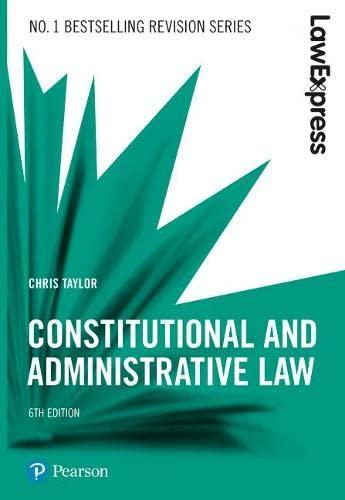Question
Do you agree or disagree with the below post: The Freedom of Information Act (FOIA) and the Privacy Act are important federal statutes in the
Do you agree or disagree with the below post:
The Freedom of Information Act (FOIA) and the Privacy Act are important federal statutes in the United States, which govern the accessibility of government records and the protection of personal information. FOIA, established in 1966, grants individuals the right to request access to a wide range of federal agency records, thus promoting government transparency. The Privacy Act, enacted in 1974, establishes individuals' rights regarding the collection and use of their personal information, requiring agencies to inform them of the purpose of data collection, allowing access and corrections to their records, and limiting unauthorized data disclosure. While FOIA promotes simplicity and government accountability, the Privacy Act preserves individual privacy rights, achieving a delicate balance between open government and personal data protection. The Telephone Records and Privacy Protection Act, passed in 2006, regulates the use of tricky procedures to obtain access to personal phone records, such as who individuals have been calling or texting. Under this law, regular people are not allowed to pretend to be someone else or use sneaky tactics to get this information from phone companies. Only law enforcement and intelligence agencies, like the police or the FBI, can do this as part of their official duties. Anyone who breaks this law and is caught could go to prison for up to 10 years. The Wiretap Act, also known as the Electronic Communications Privacy Act ECPA of 1986, is a significant piece of federal legislation in the United States that regulates wiretapping and electronic surveillance. The ECPA prohibits the interception of wire, oral, or electronic communications unless at least one party involved has given consent. Law enforcement agencies must obtain a court-issued warrant, meeting stringent probable cause requirements, to legally intercept communications. The ECPA also governs access to stored electronic data, necessitating the use of warrants by government agencies. Privacy is not specifically mentioned in the Constitution, but a common law tort encompassing privacy has evolved to include four distinct branches of privacy invasion. The Privacy Rights Clearinghouse, a non-profit organization, provides educational resources on a wide range of privacy-related issues, support to individuals affected by identity theft, monitoring and reporting on data breaches, and actively participates in the promotion of robust privacy regulations. The organization's goal is to enable individuals to effectively safeguard their personal information in an era characterized by an ever-increasing reliance on digital technologies.
Step by Step Solution
There are 3 Steps involved in it
Step: 1

Get Instant Access to Expert-Tailored Solutions
See step-by-step solutions with expert insights and AI powered tools for academic success
Step: 2

Step: 3

Ace Your Homework with AI
Get the answers you need in no time with our AI-driven, step-by-step assistance
Get Started


